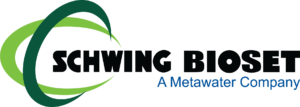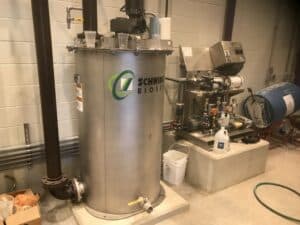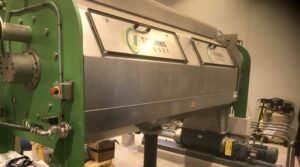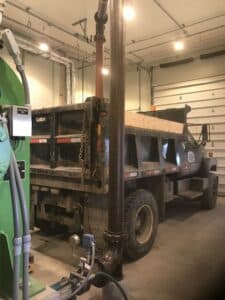Written by Sam Johnson & Eric Wanstrom
History is alive and well in London, Ohio. The midwestern town features a courthouse built in 1892, an operational tavern that opened its doors in 1837, a log cabin still standing from one of its original settlers, and more. Unfortunately, history was also present in its aging wastewater treatment facility’s dewatering processes, too.
The London Wastewater Plant faces fairly typical challenges. In addition to being short-staffed, aging equipment was creating costly inefficiencies and excessive maintenance. When its belt filter press was approaching the end of its life, the plant reached out to Schwing Bioset for help.
The London WWTP is no stranger to innovation in the pursuit of efficiency. It’s home to Ohio’s first egg-shaped anaerobic digester. It’s the optimal shape for anaerobic digestion, not common with this size plant (5.8 MGD – million gallons/day) due to higher initial capital cost over other tank shapes. The unique, futuristic design is more commonly found at large plants with minimal operating space, like the 310 MGD Newtown Creek WWTP in New York City, which handles over 50 times the capacity.
For a plant interested in the best, most efficient processes, the aging belt filter press was a big problem. It required frequent maintenance and a full-time operator, costing valuable money and personnel resources. Additionally, London wanted to improve cake dryness to reduce hauling costs and produce a more dirt-like consistency for the biosolids before beneficial re-use.
When searching for the solution, the city surveyed the market and piloted several manufacturers’ equipment. From that pilot work, it was determined that the Schwing Bioset screw press was the only answer. SBI was the basis of design for this contract due to the outstanding performance of the Prensa de tornillo during the pilot testing performed in 2021
The plant was feeding anaerobic sludge averaging 2% solids through the belt press, achieving 20% dry solids. Schwing Bioset’s main objective during the pilot test was to test the limits of performance of the screw press and establish a range of expected performance metrics based on several different press operating conditions, utilizing several different polymers.
It was clear from the beginning that the SBI Screw Press was a substantial improvement over the belt press. The pilot showed that with the same anaerobic sludge, the Schwing Bioset screw press produced an average of 29% dry solids with better than 95% solids capture, offering a projected cost reduction of annual hauling and disposal costs of 30%.
The system comes with other sought-after benefits for London as well.
The self-cleaning function is automated and on a timed cycle, running without the need for Operator intervention or suspending dewatering operations. Full automation of the Screw Press also allows it to adjust for variations in the feed sludge, eliminating the need for constant Operator supervision. The screw press has 304L stainless steel wetted components and robust engineering, ensuring minimal maintenance.
The screw press also operates at a broad throughput range – an average day ranges from 700-800 dry lbs/hour, but throughput ranging from 400-1800 dry lbs/hour is sometimes necessary. This was important to the plant. In the event of high flows or a temporary shutdown, the Screw Press can operate at over double its typical throughput to make up for lost time.
Following the pilot test, the Schwing Bioset screw press was the clear choice for London. The order was placed in 2023, and the screw press and a conveyor for transporting dewatered cake were installed in early 2025. Now, London’s dewatering worries are history.
Learn more by clicking the buttons below or by following us on LinkedIn y Facebook!





